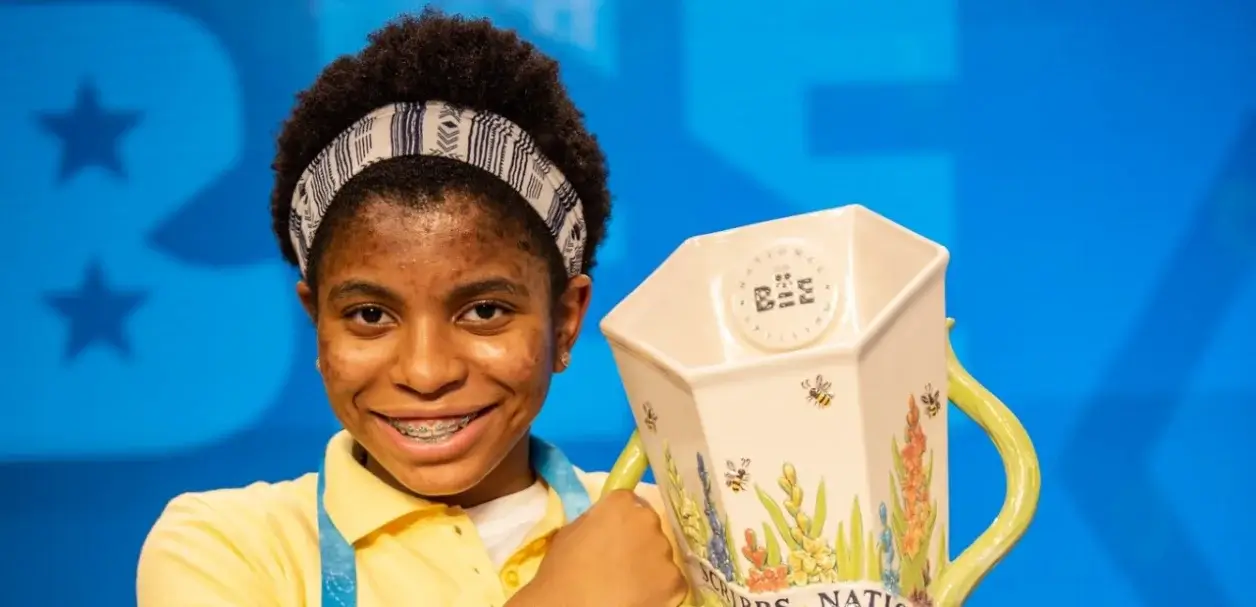For, though the origin of most of our words is forgotten, each word was at first a stroke of genius, and obtained currency, because for the moment it symbolized the world to the first speaker and to the hearer. The etymologist finds the deadest word to have been once a brilliant picture.
Ralph Waldo Emerson
I hail from Akron, Ohio, a city most famous (depending on who you ask) for being the former rubber capital of the world, the birthplace of LeBron James, or the site of Sojourner Truth’s “Ain’t I a Woman” speech in 1851. But not until Zaila Avant-garde, a black girl from Harvey, Louisiana, won the Scripps National Spelling Bee in 2021 did I hear of another of my hometown’s claims to fame: Akronite MacNolia Cox was the first black student to make it to the final round of the National Spelling Bee—in 1936.
Today the Scripps National Spelling Bee is among the most diverse academic competitions around, but in Cox’s day vicious segregation marred her ascent to the national stage. Poet A. Van Jordan, another Akron native, excavated Cox’s incredible story by obtaining information at the city’s Department of Vital Statistics and snippets from Cox’s mother’s diary, which had been preserved by a family member. Cox had to ride in segregated train cars, take back stairs, enter banquets through the kitchen, and stay at the home of a black surgeon in D.C. because the Willard Hotel where the other spellers stayed wouldn’t welcome her.
Cox spelled flawlessly in round after round of the national competition. Meanwhile her white competitors misspelled words and were allowed to remain in the competition due to technicalities. When she looked destined to win, spelling bee officials gave her a word that wasn’t on the approved list: Nemesis, the name of the Greek goddess of divine retribution and revenge, a proper noun and, by the competition’s own laws at the time, verboten. She spelled it incorrectly and was knocked out of the competition. She went home to Ohio, where scholarships she’d been promised never materialized, and she died of cancer, a domestic, at age 53.
Jordan’s poetic retelling of her story, M-A-C-N-O-L-I-A, published in 2006, tells Cox’s life story in reverse from her deathbed to the night before the historic spelling bee, the moment of her highest potential. In an article, “The Word Is ‘Nemesis’: The Fight to Integrate the National Spelling Bee,” historian Cynthia Greenlee captures the larger significance of the story: “historically, African-Americans have understood the spelling bee as a contested racial space, where mastering a word list was a feat of skill, motivation, and racial resistance through direct competition with one’s ‘social betters,’” she writes. “If black spellers weren’t actually sparring with white rivals, each word memorized—the letters, language of origin, possible meanings—was another symbolic brick building a black community hungry for the book-learning denied to them in slavery and segregation.”
Much of the media coverage of Avant-garde’s victory noted contemporary injustices that result in few black competitive spellers—expensive travel costs and competition fees, lack of sponsorships, and the fact that schools with many black children have fewer resources to support and train students. And it’s true that coaches like the fictional English professor Dr. Larabee in the movie Akeelah and the Bee are scarce and pricey. Many former Scripps Bee winners and finalists charge more than $100/hour to groom the next generation of competitors.
But the inequity is deeper and longer standing than mere access to a spelling bee. And Avant-garde, a homeschooled phenom and three-time Guinness World Record holder for basketball dribbling, is the kind of exception that accentuates the rule. She had to be extraordinary in so many ways to win her national title. The average child in America today—black or white—lacks access to spelling instruction itself, let alone opportunity for in-depth study of letter patterns, language nuances, and word meanings.
Edited and reprinted with permission from Reading for Our Lives by Maya Payne Smart, published by AVERY, an imprint of Penguin Publishing Group, a division of Penguin Random House, LLC.
Copyright © 2022 by Maya Payne Smart.
Get Reading for Our Lives: A Literacy Action Plan from Birth to Six
Learn how to foster your child’s pre-reading and reading skills easily, affordably, and playfully in the time you’re already spending together.
Get Reading for Our Lives

